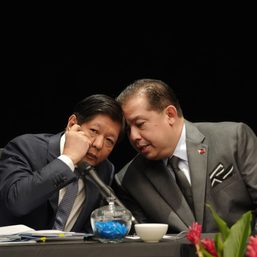SUMMARY
This is AI generated summarization, which may have errors. For context, always refer to the full article.

MANILA, Philippines – The House of Representatives approved on Monday, November 21, a bill that seeks to end to unfair labor practices against media workers in the Philippines.
Passed on third and final reading, House Bill No. 454 aims to either introduce or guarantee the following key provisions:
- receipt of not less than the minimum wage rate prescribed by the Regional Tripartite Wages and Productivity Board;
- social security and welfare benefits;
- mandatory additional insurance benefits in the event of death, disability, or medical challenges;
- hazard pay of at least P500 daily in the event of deployment to dangerous areas;
- security of tenure for employees who have tendered six months of service; and
- establishment of a News Media Tripartite Council, whose creation will be initiated by the Department of Labor and Employment.
The proposed News Media Tripartite Council will “serve as a link among various stakeholders, provide a platform where media workers and employers can agree upon mutually beneficial policies that will promote the interests of the media industry, and serve as avenue to express their aspirations, discuss their programs or settle conflicts.”
It will also have the power to decide on increasing the base amount of media workers’ hazard pay.
Why this matters
Less-than-ideal working conditions have hounded the media industry for decades.
A survey by the National Union of Journalists in the Philippines in 2021 found that 44% of respondents try to make ends meet on a monthly salary of P15,000 or below.
At least half of the respondents also disclosed that they were not entitled to holiday pay, hazard pay, insurance, or overtime pay.
In a position paper it submitted to the Senate in 2021, the NUJP also opposed the newsroom “culture” that normalized the practice of working overtime for free.
Project-based employment has also been a trend in the Philippines, preventing media workers from enjoying security of tenure.
The NUJP said that while some in the media industry find this practice beneficial as there is the potential to earn more through multiple gigs or “rakets,” the union maintained that the long-term solution is providing media workers with proper compensation for a single job.
What happens next
A total of 252 lawmakers in attendance voted in favor of the bill, which was the result of the consolidated proposals of more than three dozen legislators. No one voted against the proposed measure or abstained.
A similar bill was already passed by the House in the 18th Congress, but no counterpart bill hurdled the Senate before then-president Rodrigo Duterte stepped down in June.
In the current Senate, proposals to guarantee the rights and benefits of media workers remain pending in the upper chamber’s labor panel. – Rappler.com
Add a comment
How does this make you feel?









![[OPINION] You don’t always need a journalism degree to be a journalist](https://www.rappler.com/tachyon/2024/06/jed-harme-fellowship-essay-june-19-2024.jpg?resize=257%2C257&crop=287px%2C0px%2C720px%2C720px)





There are no comments yet. Add your comment to start the conversation.